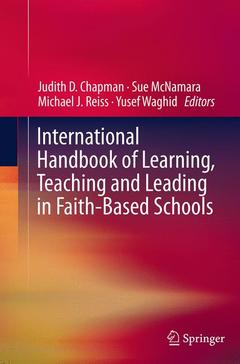Description
International Handbook of Learning, Teaching and Leading in Faith-Based Schools, 2014
Coordinators: Chapman Judith D., McNamara Sue, Reiss Michael J., Waghid Yusef
Language: English
Subjects for International Handbook of Learning, Teaching and Leading...:
Publication date: 10-2016
Support: Print on demand
Publication date: 07-2014
722 p. · 15.5x23.5 cm · Hardback
Description
/li>Contents
/li>Biography
/li>Comment
/li>
The International Handbook on Learning, Teaching and Leading in Faith Based Schools is international in scope. It is addressed to policy makers, academics, education professionals and members of the wider community. The book is divided into three sections.
(1) The Educational, Historical, Social and Cultural Context, which aims to:
- Identify the educational, historical, social and cultural bases and contexts for the development of learning, teaching and leadership in faith-based schools across a range of international settings;
- Consider the current trends, issues and controversies facing the provision and nature of education in faith-based schools;
- Examine the challenges faced by faith-based schools and their role and responses to current debates concerning science and religion in society and its institutions.
(2) The Nature, Aims and Values of Education in Faith-based Schools, which aims to:
- Identify and explore the distinctive philosophies, characteristics and guiding principles, values, concepts and concerns underpinning learning, teaching and leadership in faith-based schools;
- Identify and explore ways in which such distinctive philosophies of education challenge and expand different norms and conventions in their surrounding societies and cultures;
- Examine and explore some of the ways in which different conceptions within and among different religious and faith traditions guide practices in learning, teaching and leadership in various ways.
(3) Current Practice and Future Possibilities, which aims to:
- Provide evidence of current educational practices that might help to inform and shape innovative and successful policies, initiatives and strategies for the development of quality learning, teaching and leadership in faith-based schools;
- Examine the ways in which the professional learning of teachers and educational leaders in faith- based settings might be articulated and developed;
- Consider the ways in which coherence and alignment might be achieved between key national priorities in education and the identity, beliefs, and the commitments of faith-based schools;
- Examine what international experience shows about the place of faith-based schools in culturally rich and diverse communities and the implications of faith-based schooling for societies of the future.
Fills the need for rigorous analysis of developments in faith-based learning, teaching and leadership
Timely examination of faith-based education in a range of countries and globally
Explores developments, issues and challenges facing schools from a range of religious and faith traditions in culturally rich and diverse communities
Includes supplementary material: sn.pub/extras




